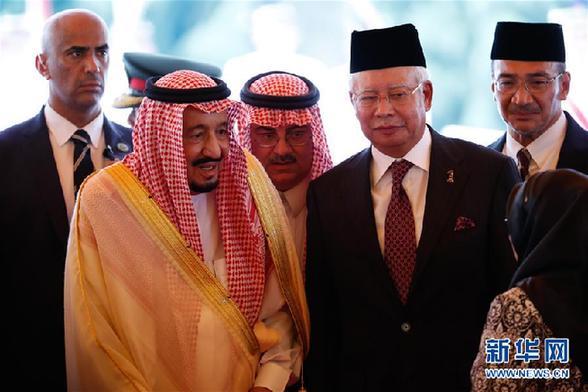Saudi King makes rare multi-nation tour
china.org.cn / chinagate.cn by Sajjad Malik, March 1, 2017 Adjust font size:
|
|
|
Saudi King Salman bin Abdulaziz Al Saud (L) stands next to Malaysian Prime Minister Najib Razak during a welcoming ceremony in Kuala Lumpur, Malaysia, February 26, 2017. [Xinhua] |
The octogenarian Saudi monarch King Salman bin Abdul Aziz Al Saud has just been in the Malaysian capital of Kuala Lumpur on the first leg of a month-long tour of seven countries, mostly in Asia.
This is a rare event by the any standards as the royal patriarchs of oil-rich Middle East kingdoms don't often venture abroad on such extended foreign visits with the main purpose of seeking cooperation and betterment of bilateral ties.
The official Saudi Press Agency reported that the King would visit "sisterly and friendly" nations - Malaysia, Indonesia, Brunei Dar Al-Salam, Japan, China, Maldives and neighboring Jordan - to promote and consolidate relations in all fields.
The monarch, accompanied by a delegation totaling almost 600, will discuss bilateral, regional and international issues of shared interest with his hosts. The visit is a reflection of Saudi Arabia's desire to reorient its ties with different nations in the wake of changing geo-strategic and economic realities.
Saudi Arabia thrived in the past on oil proceeds. The "black gold" pumped out of the earth ensured prosperity and created a dominant regional role. The Saudi royals have also been in the limelight due to their unique role as the "Custodian of the Two Holy Mosques" that form the center of the Islam faith.
There is no doubt that successive kings have won respect from the Muslim world for maintaining the dignity and religious sublimity of these two holy sites.
However, the international politico-economic order has been changing ever since the demise of the former Soviet Union. And the dominance exercised by the sole superpower (the U.S.) through international institutions and various allies has also come under challenge.
The rise of China as the second biggest economic power and with a new role as chief proponent of the globalization trend is giving it an opportunity to reshape the global economic environment.
The strategic balance has also shifted due to daredevil measures by Russia under the leadership of Vladimir Putin. The annexation of the Crimea was the high point of the emerging scenario. The crisis in Syria where Saudi Arabia was heavily involved to bring about regime change (in opposition to Russia), has been instrumental in disturbing the previous power-politics equation.
The upsurge in the role of China and Russia now faces a challenge from the electoral victory of Donald Trump. The new U.S. leader is more focused on the domestic front, yet has never minced words about having a second look at America's foreign commitments.
It has become evident that America may not be ready to defend all of its former allies in the hour of need. It is worrying not only for NATO members, but also choice allies like Saudi Arabia, heavily dependent on America for oil revenue and security.
The Iranian factor is also being played out to the detriment of Saudi Arabia. In fact, the whole edifice of stability in the Middle East is in flux due to rise of Iran and changing priorities of the U.S. Hence, it is high time for Saudi Arabia to adjust to the new situation.
Already, the kingdom has been left behind when compared with the UAE and tiny Qatar, now in the global limelight as successful economic stories. Strategically, Iran has gained a foothold in the Arab heartland of Iraq, Yemen and Syria. In terms of security, Saudi Arabia faces the threat of terrorist groups like Da'esh.
The Saudis have already woken up to the reality that their economic well-being, the political system and strategic stability might be at risk if they don't quickly adjust their policies.
And, Saudi Arabia is fighting on several fronts. Its King, and his close aides, should not only focus on foreign policy but also do something to meet the demand of the changing social system and political order.
That the Saudi leadership is actively taking steps to safeguard its economic and political interests is evident from the current royal tour, which should be viewed in a larger context, as he seeks better ties with new power centers like China and countries like Japan, Malaysia and Indonesia to increase trade and commercial links.
The chief purpose should be to seek investment for the kingdom's ambitious re-development program.
Sajjad Malik is a columnist with China.org.cn. For more information please visit:
http://www.china.org.cn/opinion/SajjadMalik.htm
Opinion articles reflect the views of their authors, not necessarily those of China.org.cn.
